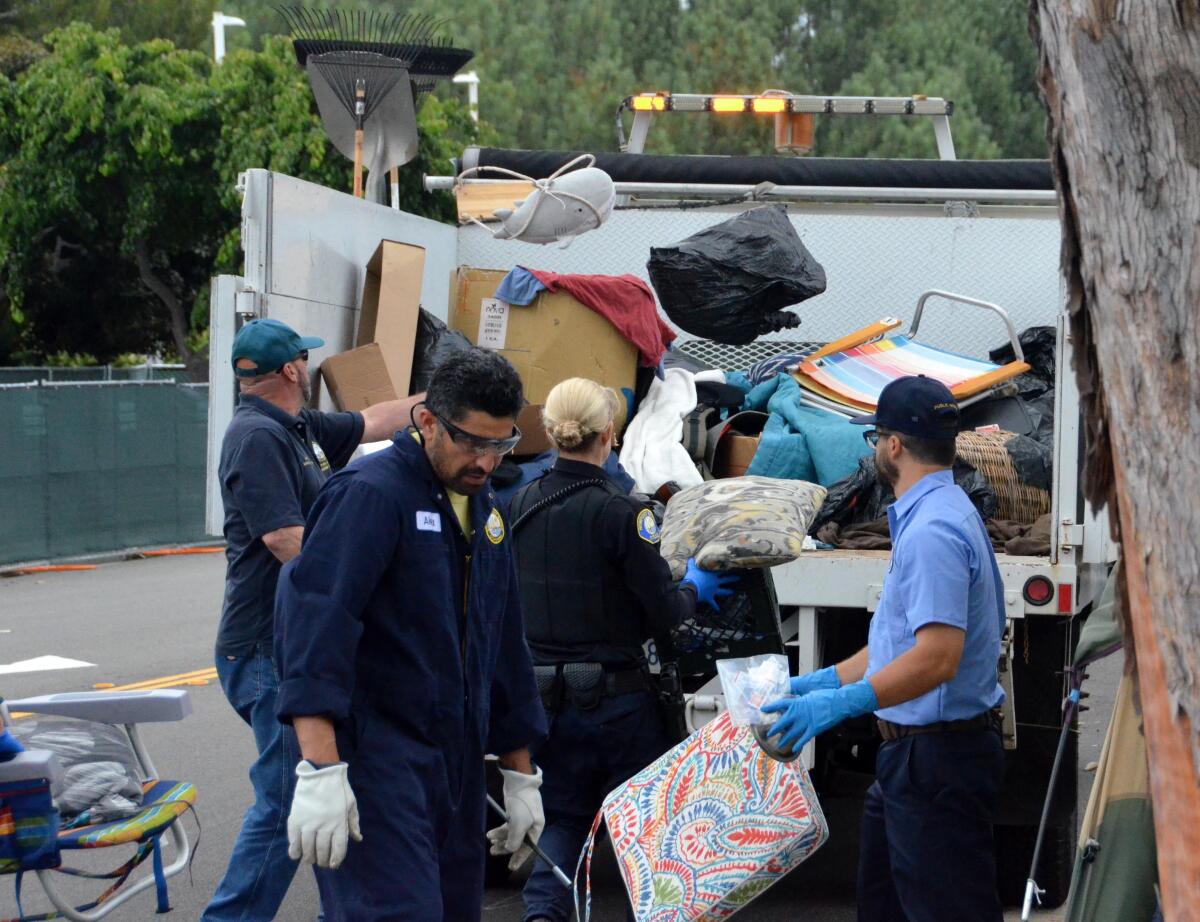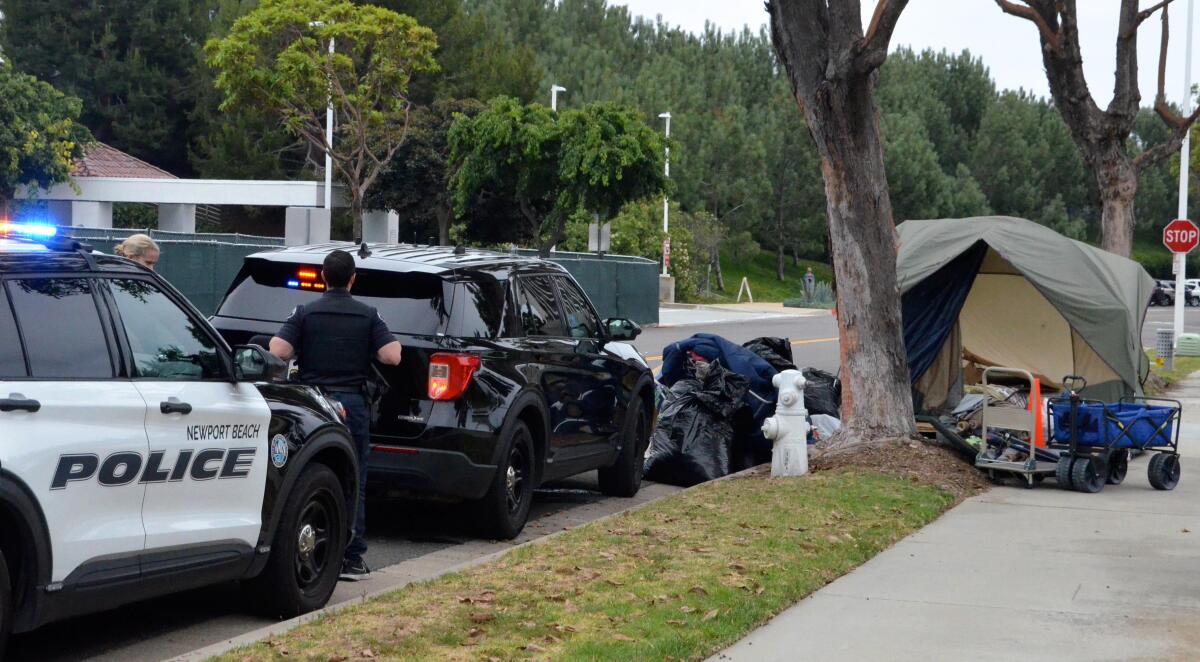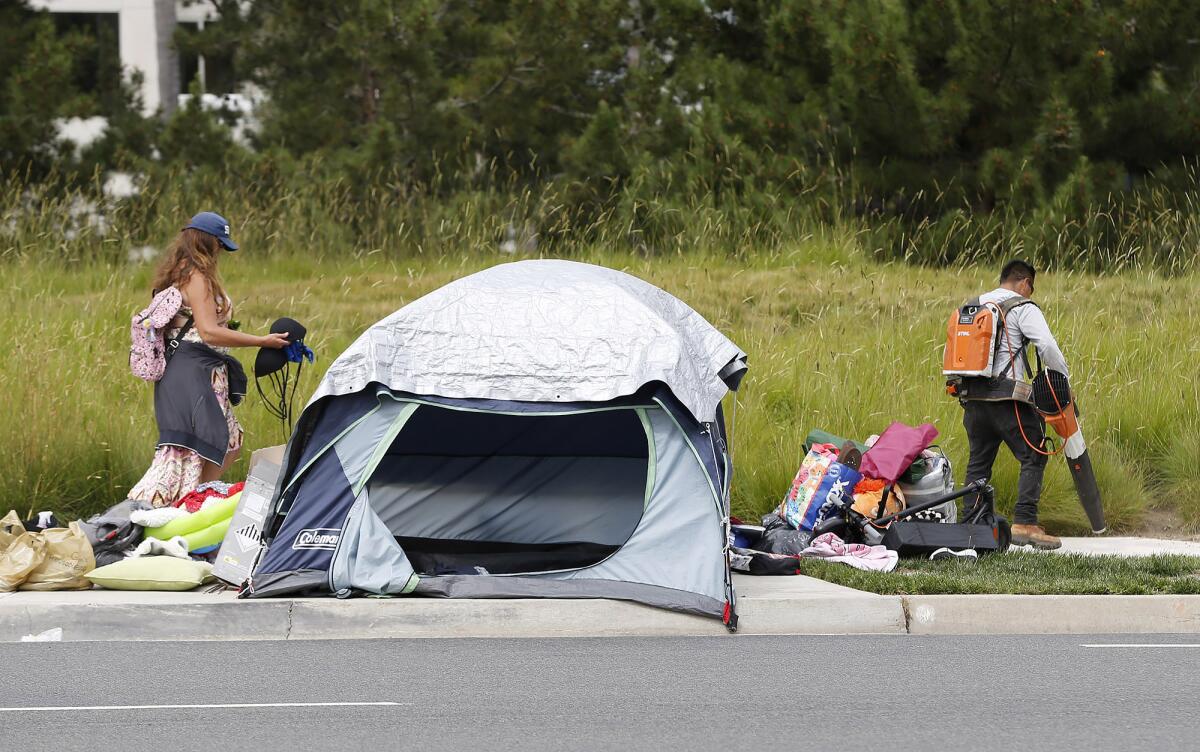Homeless encampment near Newport Beach preschool and transit center cleared out

- Share via
A cleanup crew took down a tent and cleared belongings out of a homeless encampment in Newport Beach Thursday, days after the City Council moved forward with an ordinance that would making camping in public spaces illegal if shelter beds are available.
The law currently pending a required second vote, was unrelated to the cleanup of an encampment in front of the Newport Beach Transit Center on Avocado Drive, near MacArthur Boulevard and San Joaquin Hills Road, Newport Beach spokesman John Pope said. Workers had been assigned to a landscaping project on private property there, and police were asked to help relocate people out of the area.
Police vehicles were seen parked there near a screened, chain-link fence blocking off the area, according to residents who were passing by shortly before 8:30 a.m. Crews tossed belongings left behind by people who had been living there into the back of a utility truck to be hauled away.

The encampment’s seven residents packed up and moved out after they were asked to go, mostly without incident, Pope said. One person did initially refuse but, after a discussion with officers, left without their tent. It was gathered along a mattress, wagon and other items inside, but no other tents were taken as trash.
The encampment is located across the street from St. Mark Community Preschool in Newport Beach, and was discussed during a June 13 City Council meeting. Several parents gave public comments that night expressing concern over its proximity to the campus and their children.
Most speakers voiced sympathy for people living on the streets, but they also said they felt unsafe with them around their kids. They complained about repeated instances of homeless people trespassing on campus, and said cars in the parking lot often get broken into. The preschool’s director, Maggie Brewer, told council members she often finds shattered bottles and containers full of urine on school grounds.
The ordinance presented Tuesday and unanimously approved by the City Council would make it illegal to camp on city property as well as prohibit bathing and washing clothes or dishes at public faucets and water fountains. A second vote is expected to be held at the council’s next meeting, set for July 11. Assuming it is approved again, the new law would go into effect and become legally enforceable 30 days later. However, police would not be allowed to cite those in violation of the ordinance if shelter beds or some form of emergency housing aren’t available to them.

Newport Beach resident Mark McAdams occasionally visits the encampment at the transit center and provides charity to people living there. He said that simply clearing them out and pushing homeless people away from prominent public view ignores the fundamental issues contributing to homelessness.
“Homelessness is something that we need to look at and deal with and not pretend it doesn’t exist by clearing camps like this,” McAdams said. “The city of Newport Beach seems like — and maybe it’s the residents too — maybe the majority of the city thinks, ‘get them out of my town, these worthless people!’”
McAdams said one of the encampment’s residents he knows as “Greg” told him people driving past have yelled comments like that at him. “That’s inhumane, I think,” McAdams said.
Police were attempting to connect the people at the encampment with support services, according to one of the officers working at the scene, Edgar Rebollar. He’s part of a team assigned to engage the homeless population, and noted that many of the people he approaches decline his offers.
“It’s an ongoing problem and it’s everywhere,” Rebollar said. “Our job is to try to help them, but most people won’t accept help.”
Advocates working to combat homelessness point out that signing up for and committing to treatment and support services is challenging without a phone number or address, and many aid programs require beneficiaries to have fixed residences. And those without shelter disproportionately become the victims of crimes. Those are among the reasons some view creating more emergency housing as the most important step in keeping people off of the street.
The 20 shelter beds allocated to take in homeless people in Newport Beach have consistently been at capacity, and were not available for the people who moved out of the transit center area on Thursday, Newport Beach Homelessness Coordinator Natalie Basmaciyan said. That means that even if the proposed anti-camping ordinance had been in effect, authorities would not have been able to enforce it.
All the latest on Orange County from Orange County.
Get our free TimesOC newsletter.
You may occasionally receive promotional content from the Daily Pilot.











